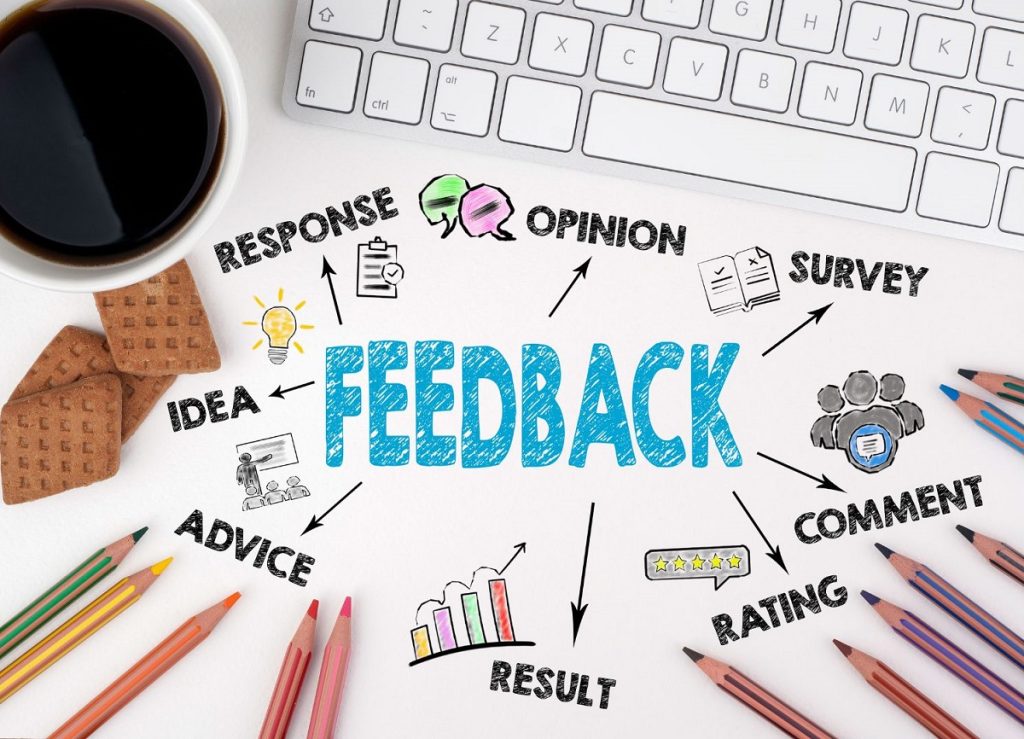Speakers can improve their speech and overall speaking ability by asking for feedback and taking suggestions to heart. Asking a friend or colleague can help you improve an upcoming speech. After the speech, your assessment and the friend’s critique can shape your future performance.
Speech-making is an art form that requires talent and practice to master. However, even the most gifted public speakers cannot improve their skills without receiving feedback from others. Giving a speech in front of an audience can be a daunting task, especially the first time, and it isn’t easy to know how well you did without seeking feedback.
This article explores the importance of seeking feedback in speech-making and how to use it to enhance your abilities as a public speaker.
What Is Feedback?
Feedback on how a speech is delivered refers to the evaluation and commentary listeners provide on the speaker’s performance. It can include comments on the speaker’s tone, volume, pace, body language, and overall effectiveness in conveying their message.
Feedback allows the speaker to gain insights into how their audience perceives them and identify areas for improvement. By incorporating feedback, speakers can refine their delivery and become more impactful communicators.
What Types Of Feedback Are There?
First and foremost, it’s important to understand the types of available feedback.
- Positive feedback can help to validate your efforts and highlight what you’re doing well. On the other hand, negative feedback can be difficult to hear, but it can provide meaningful insights into areas where you can improve.
- Constructive feedback, which includes both positive and negative aspects, is often the best type of feedback to seek. It provides specific, actionable suggestions for improvement while acknowledging what you did well.
- Performance reviews can also be a valuable source of feedback. If you are delivering speeches or presentations as part of your work performance, asking for feedback from your supervisor or colleagues can help you understand how your public speaking skills impact your work.

Should You Ask For Feedback Even If You Believe Your Speech Is or Was Good?
Yes, asking for feedback, even if you believe your speech was good, is enlightening. Feedback lets you understand how your message was received and whether your intended impact was achieved. Additionally, feedback can provide insight into areas that could be further strengthened, even in a strong speech. Finally, consistently seeking feedback can help you continually improve and grow as a speaker.
What Are Some Of The Benefits Of Asking For Feedback?
Asking for feedback can provide numerous benefits, including gaining valuable insights and perspectives, identifying blind spots or weaknesses, enhancing self-awareness, and improving overall performance.
Feedback can also help build stronger relationships and trust, demonstrating a willingness to listen and learn. Incorporating feedback into future speeches can also result in more impactful and successful communication.
What Should You Ask For When Asking For Feedback?
When asking for feedback, it’s important to be specific and intentional in your request. Ask for feedback on particular aspects of your speech, such as your delivery, message clarity, or organization.
Additionally, request examples or suggestions for improvement. The best way to ask for feedback is to be open-minded, receptive, and grateful for any insights shared. Approach the conversation with a willingness to learn and grow, and thank the person for taking the time to provide feedback.

How Do You Ask For Feedback Effectively?
The best way to ask for feedback is to be specific in your request, provide context and purpose for the feedback, and be open-minded to any suggestions or critiques. Use active listening skills to fully understand the feedback provided and ask follow-up questions if needed.
Finally, express gratitude for the feedback and incorporate it into future speeches to improve your communication skills.
How Can You Create A Process For Learning From Feedback
When seeking feedback on your public speaking, creating a feedback process that works for you is essential. The first place to start is to determine who you want to ask for feedback. Consider reaching out to colleagues, mentors, or other learners in your field. Social media platforms like LinkedIn can also be a valuable resource for seeking feedback.
Next, consider how to ask for feedback. In-person conversations can be effective, as they allow for a more personal and meaningful feedback conversation. However, you may also choose to use a template to request feedback via email or other forms of communication. When requesting feedback, be sure to ask specific questions and provide context and purpose for the feedback.

How Do You Implement Feedback?
To implement feedback effectively, start by reflecting on the feedback provided and identifying specific actions to take based on the input. Prioritize areas for improvement and create a plan to address them in future speeches.
Practice incorporating the feedback into your communication style and seek additional feedback to track progress. Finally, continue to ask for feedback regularly to ensure ongoing growth and development.
Time management is also a crucial factor in the feedback process. Seeking regular feedback can help you track your progress and identify areas for growth. Real-time feedback, provided immediately after a speech, can be particularly helpful for determining what worked well and what needs improvement.
How Should You React To Feedback?
The first step is to understand what constitutes useful feedback. The best feedback is specific and actionable and helps you identify areas to improve. Constructive criticism is essential to effective feedback, as it highlights areas where you need to focus your efforts.
Validation is also a key aspect of feedback. Positive feedback can be a confidence booster and help you identify what you’re doing well. At the same time, feedback that points out areas where you can improve is crucial for your growth as a public speaker.
How Would You Seek Feedback For Developing Your Skills And Knowledge At Work?
To seek feedback for developing your skills and knowledge at work, start by identifying specific areas you want to improve. Ask colleagues, supervisors, or mentors for feedback on those areas and request specific examples or suggestions for improvement.
Actively listen to the feedback provided and avoid becoming defensive. Finally, use the feedback to create a development plan and seek ongoing feedback to track progress and continue to grow professionally.

What Do You Do When Someone Provides Soliticited Or Unsolicited Feedback?
When someone provides solicited or unsolicited feedback, remaining open-minded and receptive is vital. Listen actively to the feedback and avoid becoming defensive or dismissive.
Ask follow-up questions to understand the feedback and identify areas for improvement. Finally, express gratitude for the feedback and use it to improve your skills and knowledge.
Performance Functionality
When seeking feedback, it’s essential to consider the functionality of your performance. Ask yourself what you are trying to achieve with your speech or presentation. Are you trying to persuade, educate, or inspire your audience? This context can help your feedback provider offer more specific and relevant feedback.
Another valuable aspect of seeking feedback is understanding how your leadership style comes across to others. Public speaking is a great way to showcase your leadership skills, and feedback can help you identify areas where you can improve your leadership presence.
What To Do When You Are Not Satisfied With The Feedback?
If you are not satisfied with the feedback received, it may be helpful to ask for additional examples or clarification to understand better the input provided. Avoid becoming defensive and try to remain open-minded to different perspectives.
If the feedback is vague or unhelpful, seek critiques from additional sources to gain a broader understanding. Finally, use the feedback received as a starting point for self-reflection and growth.
However, when receiving feedback, adopting a growth mindset is essential. View feedback as an opportunity for growth and improvement rather than as criticism. Harvard Business Review suggests that honest feedback can help you understand your leadership style, improve your work performance, and foster a culture of continuous improvement.
What Kind Of Feedback Should You Not Ask For?
When seeking feedback, it’s best to avoid asking for overly negative or unconstructive feedback. This includes insulting or dismissive feedback without providing specific examples or suggestions for improvement.
Additionally, feedback that is overly focused on personal preferences or biases may not help improve your overall communication skills. Instead, focus on seeking feedback that is specific, actionable, and constructive.

